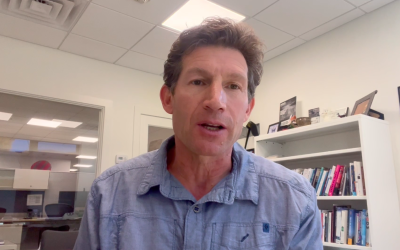Earlier, I wrote about the six things tourism businesses should know about their destination marketing organization (DMO), and the response was massive. The article obviously hit a nerve. Since then, a few tourism operators have told me that they’d like their DMO to know some important things about them as well.
I’ve worked with, spoken to and corresponded with thousands of tourism operators over the last 15 years or so. I’ve led focus groups with general managers of large hotels, ran workshops with businesses in very remote communities and facilitated ideation sessions where whole towns participated. Through this experience, I’ve learned a lot. In the interest of helping DMOs and businesses communicate and collaborate, I’ll share some tips based on the common patterns that I have discovered.
Jori Kirk is one of the most inspiring operators I know. He operates two eco-adventure parks in Saskatchewan, Canada, won the 2014 Tourism Industry Association of Canada award, and now sits on the board of Tourism Saskatchewan. He’s an impressive and switched-on entrepreneur and I invited him to speak at one of our Social Media Tourism Symposium events. His brilliant “Find Your #HappyDance” presentation inspired parts of this post:
Here are eight things your DMO needs to know about its tourism operators.
1) Most are small businesses, so get to know them
If you’ve never operated a tourism business (I haven’t, either), you need to understand the context around how your operator partners work. Most operate small businesses and have to deal with sales, cashflow, HR, maintenance, etc., without much staff. On top of that, they often have family commitments. Running a business can be tough on them and very stressful. Larger operators also deal with many of the same challenges. So try to put yourself in their shoes. Use any opportunity you have to get to know them, their business, their challenges, their observations, and so on. It’s especially important to make this effort when your job doesn’t require a lot of contact. Ask questions, empathize, observe and learn. It will help you in your job because you will better understand the challenges operators face.
2) Operators have their own challenges and need to know that they are heard
Maintaining a genuine interest in and empathy with your operators is massively important. DMO staff can appear pretty formal, scripted and politically correct. Destination marketers use a lot of research and data to understand what’s happening, but remember, that data always represents a real impact on real people. Keeping a finger on the pulse and asking operators how things are going and where their challenges are brings the data to life, and shows them that you are looking after their interests. And of course you are, but not all operators truly see that.
3) Operators are a very powerful source of knowledge and creativity
I’ve learned that tourism operators are entrepreneurial, creative, resourceful, matter-of-fact and typically not shy. Involve your operators in everything do you, because magic will happen when you tap into this energy and channel it in the right way. Ask them for input and ask for feedback. Sometimes you won’t like what you hear, but in the end you’ll always be better off for it. More than ever, destination marketing is a collaborative effort between the DMO, operators and other stakeholders. It can’t happen in isolation.
4) The “little guys” are important
Every destination has the big tourism players – these are usually the large hotels and attractions that demand attention and often get it. And rightfully so, most of the time, because they are primary drivers of tourism. But be proactive and don’t ignore the small operators. It’s especially useful to include a broad spectrum of operators during any type of consultation. Smaller operators have different challenges and perspectives that are often really valuable to learn about. They are also often a lot more flexible and nimble in how they can implement new ideas.
5) Operators are busy, too, so keep that in mind when you ask for things
A DMO can appear very demanding to an operator. The business owner may hear many requests like, “Please update your web listing,” “Buy into this campaign,” “Can you comp this travel writer? ”, “Please join our event,” “Fill out this research survey,” and the list goes on. However, most don’t see a lot of direct return of any of this or never hear about any outcomes or results.
Before you ask an operator for anything, make sure you really need what you’re asking for and have a plan to communicate results/outcomes to close the loop. Give them some love back, even if it’s a small gesture. Like I said earlier, operators are busy and they have their own needs that you should also focus your efforts on.
6) They often don’t get enough insight into what you do
This is more common than you think. Operators don’t see a lot of evidence of what a DMO is doing, exactly. This is partly driven by the fact that promotion happens in different markets that they can’t always see, but that’s no reason not to tell people about it. If people don’t know what’s going on, they’ll make it up themselves. When I’ve asked operators what their DMO does, “nothing”, “not much” or “nothing productive” are not uncommon answers.
With modern communication tools, there’s really no excuse not to stay in touch regularly. DMOs should communicate more often and more effectively about what they’re working on. Of course, DMOs typically share information through industry websites, newsletters, events and more. But these messages are often often formal and kept at a high level. Get into the details. Share. But you don’t have to overproduce things.
7) They need to see a connection between your DMO’s strategy and their business success
Most DMOs are catching up with modern marketing strategies and are diversifying their budgets. But for operators, a lot of these strategies and tactics are foreign concepts. Marketing a destination is very different from marketing a business, so your DMO needs to take a long-term view. You need to communicate your plan in a way operators understand, buy into and support. Without their support, you won’t be successful.
8) DMOs can help make their operators stronger through education
In his presentation, Jori said that the worst thing a DMO can say to an operator is “let me know if you need anything,” because they don’t necessarily know what they need. Operators know that consumer behaviour and marketing is changing fast.
From designing socialgenic experiences to creating effective promotion plans, business owners often don’t know where to start or how to be 100% effective. They look to their DMO to help them keep up and assist with building their capabilities. You need to be there for them. Many DMOs conduct training sessions for their operators. They need to do more. Your operator’s marketing is a DMO’s marketing, and in an interconnected world, you need operators to maximize their efforts.
The bottom line is that destination marketing is a collaborative effort. Communication and collaboration are keys to success for your DMO and for your operators’ businesses. Destinations and operators need to play on the same team in order to make real impact.
Related reading: 6 things tourism businesses should know about their DMO
Featured image credit: Dennis Jarvis, Flickr










That was really informative; thank you and keep up the good work. We may even meet each other at some point.
All the best from Epirus, Zagori, Greece.